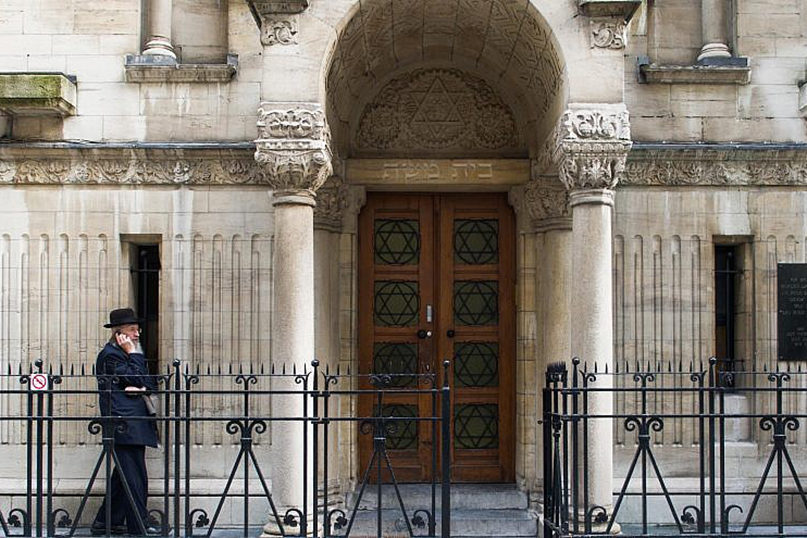
By Faygie Holt
(JNS) A report on European attitudes towards Jews released this week by CNN painted a troubling picture for Jewish communities across the continent.
“The survey results are extremely worrying, if not overly surprising,” said European Jewish Congress President Dr. Moshe Kantor. “They demonstrate that anti-Semitism is unique amongst all racisms and prejudices because its adherents subscribe to a belief that the Jews are all-powerful and control society.
“While anti-Semites might hold prejudices against other people, they frequently see Jews as central to their disturbed conspiracy theories, and that is why large parts of the population in parts of Europe have warped notions about Jews,” he continued.
In its survey of more than 7,000 individuals, CNN found that 20 percent believe that Jews wield too much influence in the media and politics, while 28 percent think Jews have too much influence in finance and business as compared to other people.
“With the rise of neo-Nazism in the east [of Europe], and Islamist and far-left anti-Semitism in the west, the Jewish community is being squeezed from all sides,” said Stephen Silverman, director of investigations and enforcement at Campaign Against Antisemitism. “The sheer ignorance and mental gymnastics of anti-Semites is demonstrated by the fact that a third of respondents believe that Jews use the Holocaust to further their agenda, while a third also know little or nothing about the Holocaust.”
 According to the CNN survey, conducted by ComRes polling, one in every 20 surveyed said they knew little or nothing about the Holocaust, while a third said Jews use the Holocaust to advance their own goals.
According to the CNN survey, conducted by ComRes polling, one in every 20 surveyed said they knew little or nothing about the Holocaust, while a third said Jews use the Holocaust to advance their own goals.
“It’s unbelievable,” said Rabbi Marvin Hier, founder of the Simon Wiesenthal Center. “To see in the graveyard where 6 million Jews died in Europe that one-in-five never heard of the Holocaust … it’s not a reassuring message for the future of Europe.”
Taken in a vacuum, the CNN study is concerning, but coupled with several other studies and anecdotal reports on the ground, it’s clear that Jewish communities across Europe face significant threats. Consider:
A recent survey of 557 Dutch Jews commissioned by a local TV station found that 43 percent take active steps to hide their Jewish identity, and 52 percent said anti-Semitism is becoming more common.
In Britain, the Community Security Trust, an organization that works to protect Jews in Britain, reported 727 anti-Semitic incidents from January to June 2018. This is the second-highest total for the January to June period, just slightly less than the 786 incidents reported in the first half of 2017.
And in France, anti-Semitic incidents rose 69 percent in the first nine months of 2018, according to a statement by Prime Minister Édouard Philippe issued on the anniversary of Kristallnacht (“Night of the Broken Glass”).
Can easily descend into violence
“Unfortunately, we now have more and more evidence that anti-Semitism is on a rise since 2000,” said Gunther Jikeli, Justin M. Druck Family Associate Researcher at the Institute for the Study of Contemporary Anti-Semitism, Borns Jewish Studies Program. “The number of anti-Semitic attacks has been growing since the turn of the 21st century, and the attacks have become more violent. At least 17 Jews have been murdered in Europe in the 21st century for being Jewish.”
Jikeli said “anti-Semitic ideas are still part of European culture in many ways.”
However, he continued, “this persistence of blaming Jews, especially for conspiracies and global control of finance, media and political power can only be explained by taking the psychological dimension into account. The anti-Semite gains something by delving into such world explanations, and by posing [as] a victim and rebel.”
Other findings in the report include the fact that more than 50 percent of those surveyed said they have never socialized with a Jewish person. Also, the report found that “more than a quarter of respondents (28 percent) said most anti-Semitism in their countries was a response to the actions of the State of Israel. And nearly one in five (18 percent) said anti-Semitism in their countries was a response to the everyday behavior of Jewish people.”
Perhaps underlying a disconnect about what actually constitutes anti-Semitism, only 10 percent of respondents said they have unfavorable attitudes towards Jews.
“While the majority of Europeans are decent people and accept their Jewish neighbors fully, there are worryingly significant minorities of opinion that hate Jews and see us as a problem,” noted Kantor. “This, as we have seen, can easily descend into violence.”
Adopt a zero-tolerance policy regarding anti-Semitism
It is time, say those on the front lines, for leaders to step up and make changes.
“Governments are running out of time to tackle the hatred that is taking hold in society,” said Silverman. “Educational efforts must be increased and matched by law enforcement and stricter regulation of hate speech by social-media companies to ensure that anti-Semites are deterred, not emboldened. Hatred that begins with Jews never ends with Jews. Europeans should know that more than anybody else.”
Richard D. Heideman, president of the American Zionist Movement, agreed, noting that “… we must denounce all expressions of hatred, prejudice and intolerance. It necessary to adopt a zero-tolerance policy regarding anti-Semitism and anti-Zionism, and all hateful behavior.”
Kantor said he “strongly” believes that European leaders are committed to combatting anti-Semitism, and that the European Jewish Congress is working to help them do just so.
To that end, the EJC just released a “Catalogue of Policies to Combat Antisemitism.” Created with the help of experts and academics from universities of Vienna, Tel Aviv and New York, it lays out “concrete policies to be undertaken by governments, public and private institutions, religious communities and those involved with combatting hate online.”
Coincidentally on Wednesday, just a day after the CNN report was published, the Dutch government voted to adopt a definition of anti-Semitism that was put forth by the International Holocaust Remembrance Alliance, which says:
“Antisemitism is a certain perception of Jews, which may be expressed as hatred toward Jews. Rhetorical and physical manifestations of anti-Semitism are directed toward Jewish or non-Jewish individuals and/or their property, toward Jewish community institutions and religious facilities.”
In taking its vote, the Netherlands joins nine other countries and the city of London, all of which have adopted the nonbinding definition of what constitutes anti-Semitism.
“While the Holocaust—the greatest destruction and attempted annihilation of the Jewish people—was the ultimate culmination of anti-Semitism in Europe, it did not begin there and seems not to have ended,” stated Kantor. “However, the greater our collective understanding of the Holocaust is, the less likely we are to repeat it. The lesser our collective understanding of it means that we could in the future repeat some of the dangerous prejudices and acts that escalated to the Holocaust.”
CAP: An Orthodox Jewish man seen outside the synagogue in the Jewish Quarter in Antwerp, Belgium, on Dec. 9, 2014. Photo by Johanna Geron/Flash90.








 Southern New England Jewish Ledger
Southern New England Jewish Ledger













